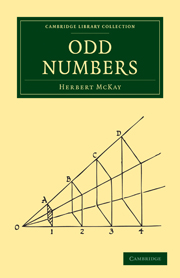Book contents
- Frontmatter
- Contents
- CINDERELLA IN GLASS SLIPPERS
- Millions & Billions & Trillions
- Great Powers & Little Powers
- How we got Logarithms
- Proportion
- Comparisons
- Proportion in Triangles
- Weights & Measures
- The Delusive Average
- Approximations
- Multiplication & Division
- Tables
- Units
- Oddities of Numbers
- The Construction & Solution of Problems
- Scales of Notation
- Frontmatter
- Contents
- CINDERELLA IN GLASS SLIPPERS
- Millions & Billions & Trillions
- Great Powers & Little Powers
- How we got Logarithms
- Proportion
- Comparisons
- Proportion in Triangles
- Weights & Measures
- The Delusive Average
- Approximations
- Multiplication & Division
- Tables
- Units
- Oddities of Numbers
- The Construction & Solution of Problems
- Scales of Notation
Summary
To hear some people talk one might imagine that a mathematical approximation is a sloppy sort of thing. So far from that being true a good approximation is an attempt to state the truth as exactly as we can.
In arithmetic we are dealing with three kinds of quantities. In the first place we have quantities that can be counted. We can count the number of chairs in a room, the number of bricks used in building a house, the number of books in a house, the population of a city, or the revenue of a country. Such things must have two qualities to make them countable: they must be separate units, and they must be alike. The likeness need not extend very far; the books may vary greatly one from another, but they must be sufficiently alike for each to be called a book. Quantities that can be counted are sometimes called discrete quantities. It is not to the point that they may be difficult to count. It would be tedious to count the number of grains in a stone of rice; nevertheless they could be counted.
The second kind of quantity is continuous and not discrete. Length is a good example of a continuous quantity. When we are measuring a length we are doing something very different from counting a sum of money or a number of books. We are so familiar with the use of rulers that we are apt to forget what we are actually doing in measuring a line.
Information
- Type
- Chapter
- Information
- Odd Numbers , pp. 124 - 142Publisher: Cambridge University PressPrint publication year: 2009First published in: 1940
